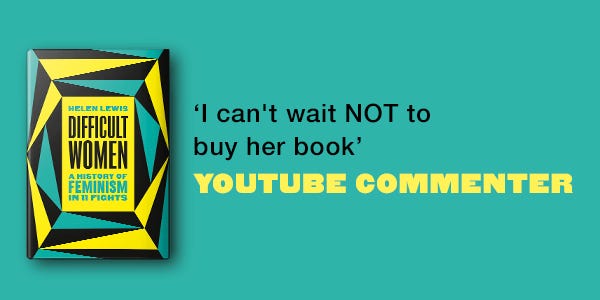Happy Friday—
As you know, I generally have a pretty jaundiced view of the impact of journalism—you’re kidding yourself if you think the world is hanging on your every word. But I am pleased to have been able to spread a little more awareness of Maureen Colquhoun, who died this week at 92. She’s the subject of the “Love” chapter of Difficult Women, and she was undoubtedly difficult. “‘Certainly I have found in my life that I have had an uncomfortable ability for upsetting equally my friends and my enemies,’ she wrote in her memoir.
When she was outed in 1976—after leaving her husband for a woman called Babs Todd—there were photographers in hiding in the bushes outside their house, and some fellow MPs shunned her. One of Colquhoun’s parliamentary colleagues, Millie Miller, complained to her that women MPs “won’t be able to have our hair short or wear trousers in public for fear of being labelled . . . Lesbian!” Her local party tried to deselect her, arguing that they thought they were getting a respectable married woman, and the fight exhausted her. She lost in 1979 to a Conservative called Tony Marlow, a man who opposed equal pay on the grounds that it gave power “to any feminist, any harridan, or any rattle-headed female with a chip on her bra-strap to take action against her employer”.
Maureen ought to be remembered, but because her own party marginalised her—first, because she was on the feminist left, and then because she was a lesbian—she’s never had the credit she deserved. Keir Starmer acknowledged as much in his tribute to her.
It took real guts to live and love openly in the 1970s, and her reward was that she and Babs were together for more than 40 years. (Babs died last year.) They will be buried together in the Lake District.
At the weekend I finished the Watchmen TV series—more news from 2019 as we get it—which has left me with Many Thoughts, and since I no longer have “coffees” and “social interactions”, I’m afraid you’ll have to hear them.
First off, whew. That was some great television. Damon Lindelof’s breadcrumb style has often provoked me in the past, but a nine-part limited series turns out to be the perfect vehicle for him, because you know the edging won’t last indefinitely. I haven’t watched anything since maybe the original Back to the Future or Steven Moffatt’s early Doctor Who stories which so successfully embeds clues to its ending all the way through.
Second: isn’t Jeremy Irons a shoo-in to play Jordan Peterson in the eventual biopic?
Third, I have enormous respect for the basic-bitchness of the soundtrack, particularly the classical choices. “Blue Danube”, “Mozart’s Requiem”, “Clair de Lune” . . . feels like Trent Reznor scanned down his 100 Classical Chillout Tracks and went “I’ll take 4, 7, 12, 19 and 23.” And I respect that. (Only “Ride of the Valkyries” was missing.) I’m not joking: it was deliberately unpretentious. Watchmen has always been about shared culture, our communal mythology, so it needed songs you could hum along to. There were also a noticeable number of cover versions—”Careless Whisper”, “Life on Mars”, “I Am The Walrus”—to underscore the point that everything is a remix.
Four, where is the essay I crave placing it alongside HBO’s Lovecraft Country? It’s so interesting they were both in the development at the same time. There are so many superficial similarities—racially inflected supernatural stories which dwell on the Tulsa massacre of 1921 and take in America’s foreign wars (Watchmen has Vietnam while Lovecraft Country took Korea)—that I want to read something smart on their differences.
Suck It, Wall Street (TK News, Substack)
This is the same James Gorman whose company just saw its 2020 fourth-quarter profits go up 51% versus the year before, with total revenues up 16% to $48.2 billion, matching almost exactly the 16% rise in the stock market last year. If you’re going to rake in $33 million as Gorman did last year captaining a firm that just siphoned off billions in essentially risk-free profits underwriting a never-ending bailout, should you really be worrying about someone else getting a “rude awakening”? There are 19 million people collecting unemployment who might be reading those profit numbers. Does this man know how to spell “pitchfork”?
I often disagree with Matt Taibbi, but I find his pungent anti-capitalism very energising.
Against “Relevance” in Art (Harper’s)
“When my friends and I consign new releases, on the basis of their subject matter, to the category of irrelevant things, we are making another kind of presumption that seems deeply harmful to me: we are presuming to know what we need from art. It’s as though we want to engineer an encounter with art the way we might engineer an encounter on a dating app, filtering by attributes we’re sure we want in a partner: a certain age or height or race. My problem with those apps is not just that swiping left is always a degraded response to another person, but also that we never know as much about our own desires as we think we do. One of the great gifts and challenges of desire is that it illuminates who we are in unexpected ways.”
This Garth Greenwell essay on “relevance” as a criterion for judging art echoes something I’ve talked about here before: that the media favours discussions of content over form, and loves to dwell on the marginalised identities of creators, because it’s an easy headline. That often seems like only telling half the story of great art: the formal innovation of Girl, Woman, Other—those falling cadences, so like texting—is just as interesting as Bernardine Evaristo’s race or sexuality. No one would care what she “had to say” if the manner of her saying it was not carefully wrought.
I Teach Dirty Tricks (New Statesman)
I’ll fetch the hammer,” says Sidney Alford, leaving me in a laboratory filled with mysteriously named drawers and small bottles with skulls on their labels. When he has fetched it – “it’s a jeweller’s hammer, given to me in Paris by a friend of Salvador Dali” – the 82-year-old plans to tap gently on a small mound of white powder called triacetone triperoxide, or TATP, better known as the explosive favoured by Isis in their suicide belts and homemade bombs. Because of its instability and destructive power, its nickname is “Mother of Satan”.
Tapping it with a hammer is enough to make it go bang.
Directing me to stand by the door, he searches for ear plugs before stuffing some paper in his ears – “I’m quite deaf, you know,” were almost his first words to me that morning – and begins to tap the Mother of Satan. On the fourth tap, it explodes in a genteel fashion with a flash and a pop. Its sensitivity to percussion is one of the reasons that jihadi bomb-makers suffer so many workplace accidents. “See,” Alford says. “You’d be OK walking, just don’t fall over or get shot.”
I got a message last week that explosives expert Sidney Alford had died at 86—“for such a master at the art of staying alive it’s a major failure," said the friend who emailed me—which is a good excuse to repost my 2017 profile. After a day blowing stuff up in a quarry, I now understand why some men only read books about the Second World War.
Quick Links
“Their letters are ardent, erudite, moving and playful. They are filled with gossip, desire, jealousy and tips on craft. And perhaps most delightfully, they are frequently laugh-out-loud hilarious. Virginia wonders in her diary: ‘Am I in love with her? But what is love?’” In these letters, both those questions are answered in dazzling, digressive detail.” Alison Bechdel’s introduction to the letters of Vita & Virginia.
“It is my 30th birthday. I am at work at my former employer. To much fanfare, my boss brings in an eight-pack of Diet Coke, with a burning candle stuck in it. I am delighted.” (Guardian) Jonathan, if you’re reading this, see look see, my Diet Coke habit could be so much worse!!!
Jill Filipovic on why people didn’t believe Marilyn Manson when he talked about sexually assaulting women, and why people didn’t believe AOC when she talked about being assaulted, is stomach-churning. Manson wrote about tying up and fingering a woman he’d tricked into drinking herself semi-conscious in his own memoir. He confessed! And yet it still wasn’t enough. There’s a Rebecca Solnit line I quoted in Difficult Women: “Billions of women must be out there on this six-billion-person planet being told that they are not reliable witnesses to their own lives, that the truth is not their property, now or ever.”
In 2004, the New York Times asked Stephen Hawking: what is your IQ? He replied: “I have no idea. People who boast about their I.Q. are losers.”
This Bad Impressions version of The Dig makes me feel better about watching The Dig. Fascinated to know what Simon Stone was going for by showing so much dialogue over images of the people involved not talking. I think he was trying to show the chasms between us and the impossibility of being fully understood by another human being, but the first few times it just looked like an editing error. Anyway, my parents loved it, so it takes all sorts.
“I’m a writer on Emily in Paris and I May Destroy You Deserved A Golden Globes Nomination.” (Guardian)
“I’d always considered myself quite a chilled-out child, especially given the madness I’d entered at 14: the surreal world of underage pop starlet. But actually, it had been there all along. As a child in the town of Swindon, I was obsessively neat and, it seems to me now, strangely ambitious. Homework would be completed way before its deadline. I avoided inviting other kids over to play, in case they messed up my bedroom. Of course, this was all rewarded: the adults in my life congratulating my parents and me on what a good, conscientious girl I was.” Billie Piper on mental health (ELLE).
This week’s Spark is about loneliness as a political phenomenon.
See you next time . . .








